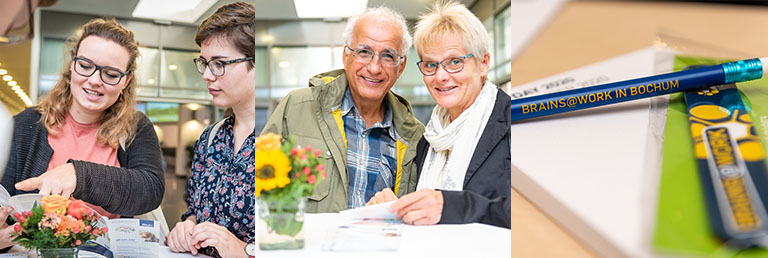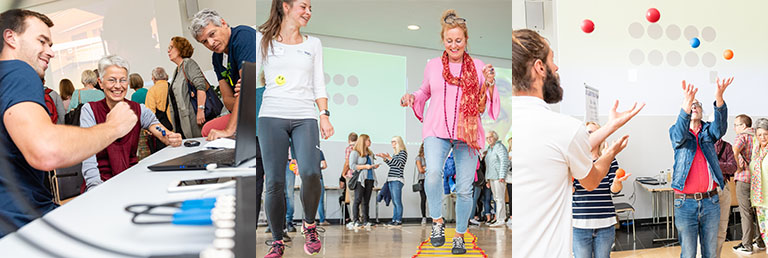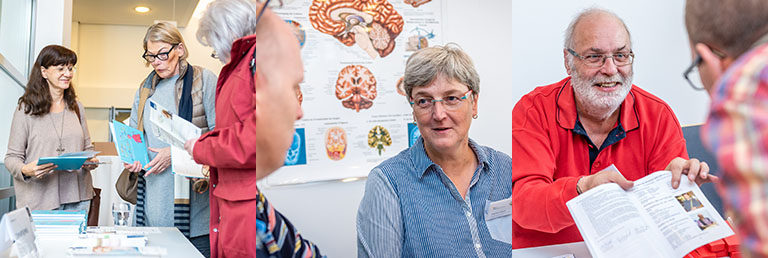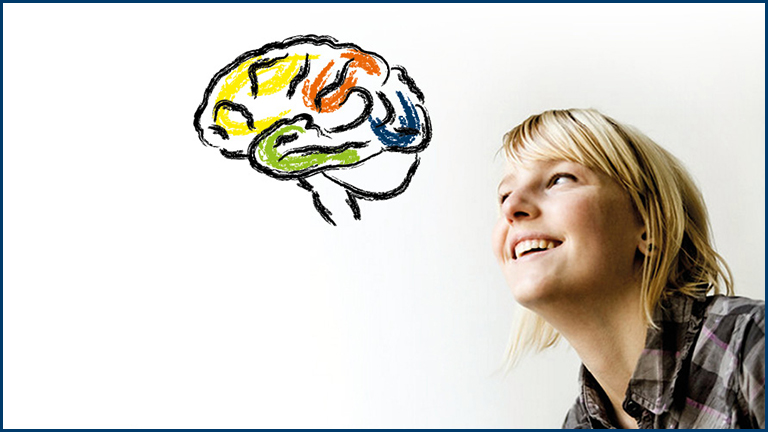BRAIN DAY 2021 – Programme

| 13:30 | VIRTUAL PRESENTATION DESKS OF THE SELF-HELP GROUPS | |
| 14:00 | WELCOME AND OPENING Prof. Dr. Denise Manahan-Vaughan, Speaker SFB 874, Ruhr-Universität Bochum | |
| 14:10 | TECHNICAL “BRAIN HACKS” – Which possibilities do we have to access brain activity? PD Dr. Dirk Jancke, Optical Imaging Lab, Institut für Neuroinformatik, Ruhr-Universität Bochum | |
| Read more How do visual perceptions arise? How are thoughts formed from the multitude of active neurons in the brain? How does the brain encode information and how can we access or even change it? Privatdozent Dr. Dirk Jancke is vice-speaker of the SFB 874 and investigates functions of the visual system with regard to perception and possibilities of their changeability by learning processes. In the lecture some basic neurophysiological methods will be presented, which help to approach the “language” of the brain. | ||
| 14:40 | MICROGLIA ACTIVATION – The health guardians in the brain and their consequences for schizophrenia and bipolar disorders Prof. Dr. Georg Juckel, Klinik für Psychiatrie, Psychotherapie und Präventivmedizin, LWL-Universitätsklinikum Bochum | |
| Read more In the healthy brain, microglial cells act as a link between the neurological system and the immune system. Disruption of their activity can lead to diseases with changes in behavior and experience. At BRAIN DAY, learn more about processes in brain development and their potential influence on glial cells. What new models are researchers using to better understand these processes in the context of schizophrenia and bipolar disorder? What is the importance of brain maturation in the second trimester of pregnancy in this context? Prof. Dr. Georg Juckel from the LWL-Universitätsklinikum Bochum für Psychiatrie, Psychotherapie, Präventivmedizin und Psychosomatische Medizin in the Regional Association of Westphalia-Lippe (LWL) offers exciting answers. | ||
| 15:10 | COFFEE BREAK + SUPPORTING PROGRAMME | |
| 16:10 | MY PAIN IS NOT YOUR PAIN – How the knowledge of pain mechanisms can contribute to a better pain therapy Prof. Dr. Elena Enax-Krumova, Neurologische Klinik und Poliklinik, BG-Universitätsklinikum Bergmannsheil Bochum | |
| Read more Chronic pain affects about 17% of all Germans. In particular, pain due to nerve damage is still difficult to treat. The therapeutic options that are currently available often have an insufficient effect or several treatment attempts are needed before effective pain treatment is achieved. Still, research over the last 10 years has shown that a better understanding of the mechanisms of pain development can contribute to a targeted, individually adapted pain therapy. This presentation will provide an overview of the important mechanisms of pain development and how these will impact the planning of drug and non-drug pain management in the future. | ||
| 16:40 | SUCCESSFUL BRAIN TUMOR THERAPIES – What are their effects on memory and personality? Prof. Dr. med. Uwe Schlegel, Neurologische Klinik, Universitätsklinikum Knappschaftskrankenhaus Bochum | |
| Read more Our treatment options for brain tumors are improving constantly. Certain malignant tumors that used to lead to death within a short time are now even curable. However, what marks and long-term effects do the therapies, which are often stressful, leave on personality, intellectual performance and memory, and how can we treat these effects? |
SUPPORTING PROGRAMME

EVENTS FOR PARTICIPATION
“Beat, Sound & Speed” – Musical acrobatics for the brain
with Michael Bradke, MobilesMusikMuseum, Düsseldorf
Whether body music, noise tools or sound sculptures – Michael Bradke has been collecting, preserving and developing sounding objects from all over the world for 20 years. At BRAIN DAY 2021, the inventor of the MobilesMusikMuseum takes all visitors on a musical journey and uses simple tools to illustrate how rhythm and melodies affect people’s perception. His approach: music is acrobatics for the brain!
„I can remember exactly that…“ – Exploring generative memory
with Prof. Dr. Sen Cheng, Computational Neuroscience, Institut für Neuroinformatik, Ruhr-Universität Bochum
Who does not know this? In a dispute, the sentence “I can remember exactly that…” often comes up. But is that true? In a demonstration, Prof. Dr. Sen Cheng shows that memory is not that good at storing memories, nor does it have to be.
VIRTUAL LAB VISITS
What is otherwise hidden from the visitors of BRAIN DAYS, we make visible online. Follow us into two laboratories of the SFB 874, where neuroscientific questions are worked on in very different ways. Please don’t get stressed when you go to the lab of Prof. Dr. Oliver T. Wolf for a stress test…
…and look over the shoulder of the team of Prof. Dr. Jonas Rose when they take you into the fascinating world of corvids…
INFORMATION STANDS OF THE SUPPORT GROUPS

Self-help groups from the region will present their work with a virtual presentation booth between 13:30 and 14:00.
- Alzheimer Gesellschaft Bochum e.V.
- autismus Dortmund und Umgebung e.V.
- Deutsche GBS-CIDP Selbsthilfe e.V.
- Der Paritätische – Selbsthilfe-Kontaktstelle Bochum
- „Leben mit Schädel-Hirn-Trauma“
- Morbus Fabry Selbsthilfegruppe e.V.
- Stiftung Deutsche Schlaganfall-Hilfe
TECHNICAL REQUIREMENTS AND ONLINE ACCESS
In 2021, BRAIN DAY will be held for the first time as an online event. As technical equipment, you will need nothing more than an internet-enabled device with camera and microphone/speakers such as a computer, laptop, tablet or smartphone.
Please, register in advance to participate at BRAIN DAY. You will find our contact information at the bottom of this page. Please name your first name, last name, organization if applicable, and your email address.
Important: We need your e-mail address to send you your personal access link to the event.
Deadline for registration is Monday, September 27, 2021. We use the platform “zoom” to host the conference.
You will receive detailed information on how to participate via zoom with the access link.
REGISTRATION
Participation is free of charge. Registration is requested at:


